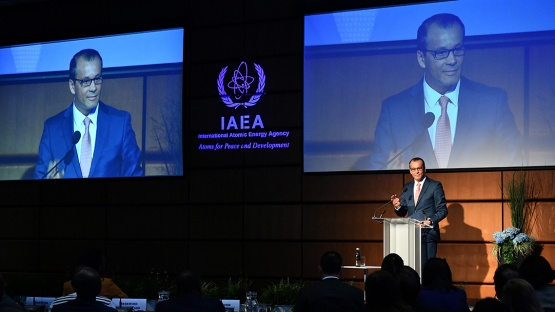(As prepared for delivery)
Professor Doctor Your Royal Highness, Excellencies, Ladies and Gentlemen,
I am pleased to welcome you all to the 2019 IAEA Scientific Forum.
We are honoured that Professor Doctor Her Royal Highness Princess Chulabhorn of Thailand is here today. The IAEA has had very fruitful cooperation with Thailand in human health for many years.
Ladies and Gentlemen,
When world leaders adopted the Sustainable Development Goals in 2015, they made a commitment – in SDG 3 on good health and well-being – to reduce the number of deaths from non-communicable diseases such as cancer.
Cancer killed nearly 10 million people last year. That is a shocking figure.
This number is expected to continue to rise. Cancer is no longer a disease of prosperous countries, as it was often perceived to be in the past.
By 2030, some 60 percent of all new cancer cases will be recorded in developing countries, and that is where around 70 percent of cancer-related deaths will occur.
Radiation medicine plays an essential role in the diagnosis, treatment and management of cancer.
Over the last ten years, under the leadership of our late Director General Yukiya Amano, helping low- and middle-income countries to improve access to radiotherapy and nuclear medicine became a top priority for the IAEA. That will remain the case.
Many parts of the Agency are involved, including the Division of Human Health, TC Regional Divisions, the Programme of Action for Cancer Therapy, the Division of Physical and Chemical Sciences and the Department of Nuclear Safety and Security.
Cancer, and human health generally, are also priorities for our 171 Member States. Health accounts for around a quarter of spending under the IAEA technical cooperation programme.
Ladies and Gentlemen,
Half of all cancer deaths are among women. Millions of women in developing countries suffer and die from cancers that would often be treatable if they had access to modern cancer care.
Breast and cervical cancers are the most common killers in low- and middle-income countries. In 2018, more than two million women were diagnosed with breast cancer in such countries. Around 600,000 women died of the disease. This is a great tragedy.
I am pleased to announce the launch of a new initiative, in partnership with the Islamic Development Bank, to fund IAEA projects tackling women’s cancers in countries which are members of both the Bank and the Agency. I am grateful for the Bank’s support in this important effort.
Ladies and Gentlemen,
In the next two days, you will hear about the progress made in many countries in improving access to modern cancer care, often with the assistance of the Agency.
There is much to be proud of. Nuclear techniques have made a significant contribution to human well-being and saved tens of millions of lives.
But the problems remain huge. Many low-income countries are still ill-equipped to deal with the growing cancer burden.
Dozens of countries do not have a single radiotherapy machine and there are nearly 60 countries where less than a quarter of patients have access to radiotherapy. In many cases, prevention, screening, early diagnosis and treatment services are non-existent or inadequate.
The IAEA helps countries to improve cancer care both at the level of individual hospitals, and at the policy level.
We send experts to assess the level of nuclear medicine and radiotherapy services in a country and offer recommendations on improvements.
We help countries to plan and build nuclear medicine and radiotherapy facilities.
We arrange for the education and training of oncologists, radiologists, and medical physicists.
We advise countries on putting the necessary nuclear laws on the statute book and adhering to IAEA nuclear safety standards and security guidance.
We offer dosimetry and quality management services to ensure patients receive just the right dose of radiation.
Today, the Agency and the World Health Organization are launching a new Roadmap towards a National Cancer Control Programme. It sets out milestones which countries can follow in establishing nuclear medicine, diagnostic imaging and radiotherapy services.
You will learn more about this during your meeting. I am confident that the new Roadmap will become an indispensable tool for Member States.
Ladies and Gentlemen,
Over the next two days, you will learn about some of the dramatic technological advances being made in the cancer field, and about the work of the IAEA to make these available to as many patients as possible.
Tomorrow, you will hear how computer simulation helps surgeons to remove tumours, how artificial intelligence and apps make doctors’ work easier, and how radiopharmaceuticals help not just to detect cancers, but to target and treat them.
Patients around the world benefit greatly from the collaboration between the Agency and the WHO, as well as with professional organizations and NGOs, many of whom I am pleased to see represented here today.
I am confident that your discussions in the next two days will bring us new insights on how to maximize our assistance to Member States to make the most of nuclear technologies for human health.
I am grateful for the presence of high-level representatives here today. This reflects the importance which countries attach to cancer control and to the IAEA’s work in this area.
I thank the experts, both on the podium and in the audience, who have come to share their knowledge for the benefit of all Member States.
Ladies and Gentlemen,
The ultimate reason why all of us are here in this room today is because we want to save lives. At the IAEA, we keep the needs of individual cancer patients uppermost in our mind.
We will now see a film about what this means in practice, taking the very encouraging example of one country.
I wish you a very successful meeting.
Thank you.


